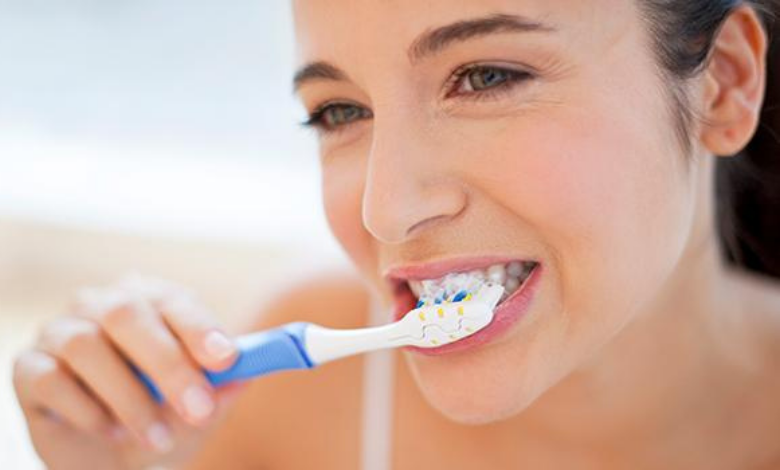People usually have different questions when it comes to oral health and hygiene. Here are some questions and answers that can help you develop a good dental routine.
Should my teeth be brushed before eating breakfast or after?
Brushing before having breakfast will keep your teeth safe because of the fluoride in the toothpaste. If you brush after having breakfast and eating sugary foods, the chances are that you’ll rub the sugar into your enamel, and it’ll cause tooth erosion and decay.
If you want to clean your mouth after eating, rinse off your mouth with water or chew on sugar-free gum, particularly one containing xylitol, as it prevents tooth decay.
Could I be brushing the wrong way? What’s the right way to brush my teeth?
Not brushing your gumline, overbrushing, and hurrying through the brushing are the major mistakes people make while brushing.
Hold your toothbrush at an angle of 45° towards the gumline. Skipping the gum line while brushing will allow plaque to build up. This can cause gum disease.
If you can, get an electric toothbrush as it cleans better than the manual or battery-operated types.
Brush your teeth and gums gently for 2 minutes, whether you’re using a manual or electric toothbrush. Ensure you have the toothbrush or its head changed every three months.
After brushing, should I rinse my mouth?
The fluoride in the toothpaste which protects the teeth will be washed off when you rinse after brushing. So, spit.
If I have eaten sugary or acidic foods, should I brush them immediately or give them some time?
Do wait for 30 to 60 minutes after eating foods containing sugar or acid before brushing. Doing it immediately will rub the acid or sugars on the enamel, causing it to weaken.
Limit sugar intake to less than 3 to 4 times a day and eat sugary and acidic foods only at mealtimes. Constantly eating sugars without any break in between damages the teeth, as saliva doesn’t have time to neutralise the effect. To know more, book dental hygienist near you.
Which toothpaste is the best for use?
Ensure to use dentist recommended toothpaste containing 1450 parts per million (ppm) of fluoride.
The Regenerate Enamel Science toothpaste contains fluoride and enamel-protective properties and produces essential minerals the teeth need.
Parla toothpaste tablets are very good for the teeth.
For sensitive teeth, consult a dentist first to know the cause before getting the right toothpaste for it.
Whitening toothpaste should be avoided. They lack active whitening ingredients, and fluoride may not be present. These products may take out surface stains, yet they’re abrasive, enamel-damaging and promote more teeth staining.
In general, charcoal toothpaste may not have the same level of abrasion as whitening toothpaste, but there’s no evidence supporting its stain-removing effect. Particles of charcoal may get stuck between cracks in teeth or the margins of veneers, fillings and crowns and result in unpleasant teeth appearance, yellowing, and gradual staining.
How important is flossing? Are water flossers recommended?
Only around 60 per cent of the teeth are cleaned with a toothbrush. This means the space in between teeth is not reached. But flossing will get to these areas and remove food particles and plaque, preventing tooth decay and gum disease.
The biggest size of interdental brushes is recommended for teeth with large spaces in between. But dental floss is good for minimally spaced teeth. Flossing is recommended once daily, especially at night.
To add to regular flossing, electric flossers can be used.
Which foods and drinks are bad for the teeth and why?
Lack of essential vitamins and minerals in the mouth affect soft tissues and hard structures (bones and teeth). Mouth ulcers are indicative of a deficiency of vitamins.
Eat a healthy diet consisting of all the main food groups. Don’t take sugary drinks and acidic foods between meals to avoid damage to the enamel, stabilise blood sugar, raise energy levels and trigger a good appetite.
Take your drinks with a straw and rinse your mouth with water after eating or drinking dark coloured substances.
Processed foods and meat, and refined carbohydrates should be avoided. Instead, eat so many healthy fats, nuts, lean protein and plants.
Where possible, reduce alcohol and coffee consumption; you’ll have healthy teeth doing so.
Would you recommend teeth whitening?
Since the shade of teeth varies from person to person, identifying the cause of the discolouration first is important. See a professional dentist for help. They’ll recommend, after checking your eligibility, the best whitening treatment for you.
A professional tooth cleaning using airflow technology is a great technique you may benefit from as it removes stains and deposits from teeth.
For a professional whitening, you may get an in-surgery treatment that lasts for 1 hour or at-home whitening that takes about two weeks to make your teeth brighter. With at-home whitening, you can keep your tailor-made trays and add whitening layers to your teeth a couple of times a year using special gels.
Kindly avoid unprofessional teeth whitening. Legally, only a registered dental expert is allowed to whiten teeth. Your dentist must assess you to confirm suitability before a whitening treatment. Contact the Dental Hygienist London for this.
How often should I have a dental visit?
To maintain your smile, visit your dentist at least once each year and the hygienist once or twice each year. Don’t miss your appointment with the dentist and hygienist. Having regular check-ups implies there is a medical record of your dental health changes. Screening for dental decay and gum disease is available for you, and they can be prevented. You can also be screened for oral cancer. Visiting your local practice in addition to a dental hygiene routine is critical to having a healthy mouth.
For more tips, you can book dental hygienist near you. At our practice, we provide the best possible dental care. Contact us today.

